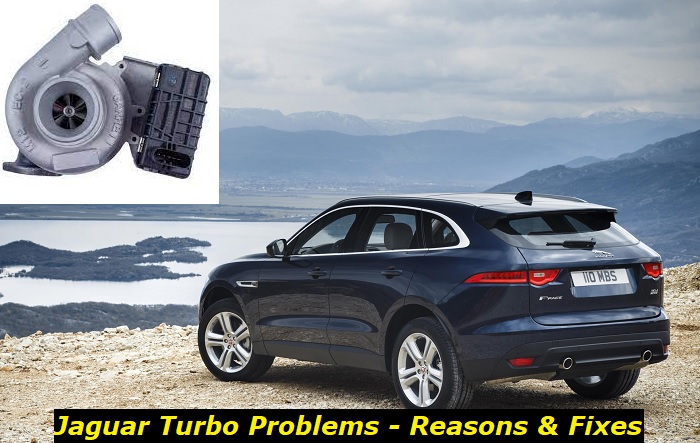Turbochargers, also known as Turbo, are a popular engine feature that increases the power output of an engine. Jaguar offers turbocharged options that come with this power-increasing part right from the factory.
Turbo problems highlights
- Level of importance:Medium
- Commonreasons:Mileage, age, poor lubrication, internal damage, aggressive use
- DIY inspection:Possible but may be complicated
- DIY repair:Sometimes, possible
- Price for repair:$350 - $800
- Can you drive?In most cases, yes
- Ways to fix:Replace the parts thatare diagnosedto be faulty

Symptoms of Jaguar Turbo Problems
When your Jaguar's turbo develops a problem, there are some symptoms that you may notice. If you have experienced any of these symptoms, then your turbocharger may have a problem that needs to be addressed. Here are some of the most common symptoms of Jaguar turbo problems:
- Loss of power
This might be the first symptom you notice, especially if you're fond of the power boost you get from your Jaguar's turbo. If the turbocharger is not functioning as it should, the engine might not produce as much power as it normally does. This results in a noticeable reduction in performance, especially at higher RPMs.
- Excessive exhaust smoke
A functional turbo will reduce the amount of exhaust smoke by ensuring that the fuel in the engine is burnt more completely. Excessive exhaust smoke is a sign that the turbo is failing.
- Blue exhaust smoke
Blue exhaust smoke is a sign of oil entering the combustion chamber. In a turbo, this is caused by a crack in the turbo housing that allows oil to leak into the exhaust system.
- Whining Noise
A functional turbocharger actually makes the engine slightly quieter. This is because it reduces the sound of the air intake. If your engine makes a loud whining or drilling noise, then it's a sign that the turbo is failing.
- Increased fuel consumption
Your jaguar's turbo functions to increase your fuel efficiency, which helps you get more mileage out of your fuel. If you find yourself fueling up more frequently, then your turbo might be failing.
- Check Engine Light
The check engine light is used as a signal for many different problems with the engine, and the turbo is one of them. If you notice a check engine light
Reasons for Jaguar Turbo Problem
In normal situations, turbos are very reliable. They generally last a long time and don't develop any faults on their own. Most turbo problems are a result of poor engine maintenance, particularly insufficient engine lubrication.
There are several reasons that a turbocharger on a Jaguar may fail or experience problems. Let's take a look at the common causes of turbo failure.
1) Oil Starvation/Contaminated Oil
Any car's engine requires engine oil to keep the moving parts lubricated and cool while operating.
Your Jaguar's turbocharger particularly requires clean, high-quality oil to keep the bearings cool and lubricated. Turbos operate at high speeds and temperatures and will quickly become damaged if there is not enough oil to keep them sufficiently lubricated.
Contaminated oil will also introduce contaminants that can cause abrasive damage inside the turbo. A damaged oil filter will also allow contaminants to reach the turbo.
2) Foreign Objects
Foreign objects can get pulled into the turbo through the air intake. This happens when the air filter or intake hoses are damaged. Small particles like sand, dirt, and small debris can find their way into the compressor where they cause significant damage to the turbo.
3) Overheating
Turbochargers generate a lot of heat through their normal operation. The high temperatures generated by the turbocharger can cause it to fail and damage if it is not cooled sufficiently.
Overheating in turbochargers is usually caused by a lack of oil to cool the turbo bearing. It can also be caused by insufficient airflow due to a clogged air filter.
4) Wear and tear
Like any mechanical system, the turbocharger is subject to wear and tear over time. As it ages, the bearings and other components may begin to fail, which can result in turbocharger problems.
Jaguar uses high-quality turbochargers that should last the lifetime of the engine. If proper maintenance is carried out, wear and tear should not occur.
Solutions for Jaguar Turbo Problems
If you suspect that your Jaguar has a problem with its turbocharger, the first thing you should do is have it inspected by a qualified mechanic. They will be able to diagnose the problem and recommend the appropriate solution. Some common solutions for turbocharger problems on a Jaguar include:
- Replacing Damaged or Worn Components
Turbochargers have several components that can wear down or get damaged. If the turbocharger is not fully damaged, then it can be repaired if the damaged components are replaced.
Some parts of the turbocharger that may need to be replaced are the turbine, the bearings, and the compressor.
- Replacing the Turbocharger
If the turbocharger is beyond repair, it may need to be replaced. This can be a costly repair, but it is necessary to restore the performance and reliability of the vehicle.
- Cleaning or replacing the Oil
If the problem is caused by oil contamination, cleaning or replacing the oil may be sufficient to solve the problem.
If the problem is caused by oil starvation, supplying the engine with clean oil will get it running again, if damage hasn't already occurred.
- Replacing Oil Filter and Oil Feed Hoses
Blockages in the oil filter and the oil feed hoses can prevent the turbo from receiving sufficient oil. This will cause oil starvation issues that can result in overheating and excessive wear.
Examine the oil filter and change it if it is blocked or dirty. Remove the oil feed hoses and inspect them for clogs. You can try to manually clear any blocked hoses you find.
- Replacing Air Filter and Intake Hoses
Holes in the air filter and air intake hoses can allow debris and foreign objects to enter the turbo. This will cause damage to the compressor. You can inspect your intake hoses by running the engine and listening for a hissing noise from the hoses. A damaged air filter or hose should be replaced.
If the compressor has already been damaged, it will need to be replaced.
A clogged air filter will hinder the airflow through the turbo, resulting in a drop in power and overheating. If your air filter is clogged, it should be replaced.
How to Maintain Your Jaguar's Turbo
Jaguars are built with high-quality turbochargers that should last the entire lifetime of the engine. If proper maintenance is carried out, your turbo should serve you faithfully as long as the engine does.
Fortunately, maintaining your turbo does not require any special knowledge or skills. Basic engine maintenance is enough to protect your turbo. Here's what you need to do to keep your turbo in good condition.
- Change your oil frequently
- Use the recommended grade of engine oil
- Replace your oil filter frequently
- Replace your air filter frequently
Conclusion
Jaguar turbo problems can be caused by a variety of issues, but the main issue is usually poor engine maintenance. Oil starvation, contaminated oil, and clogged or damaged air and oil filters can cause serious damage to your turbocharger.
If you suspect that your Jaguar has a problem with its turbocharger, it is important to have it inspected by a qualified mechanic as soon as possible. They will let you know if the turbo can be repaired or if it needs to be replaced. You will also need to address the cause of the problem by changing your oil and replacing any damaged filters.
Jaguar uses high-quality turbochargers that should last a long time without failure with proper maintenance. Keeping your turbo in good order is as simple as performing regular engine maintenance.
About the authors
The CarAraC research team is composed of seasoned auto mechanics and automotive industry professionals, including individuals with advanced degrees and certifications in their field. Our team members boast prestigious credentials, reflecting their extensive knowledge and skills. These qualifications include: IMI: Institute of the Motor Industry, ASE-Certified Master Automobile Technicians; Coventry University, Graduate of MA in Automotive Journalism; Politecnico di Torino, Italy, MS Automotive Engineering; Ss. Cyril and Methodius University in Skopje, Mechanical University in Skopje; TOC Automotive College; DHA Suffa University, Department of Mechanical Engineering






Add comment